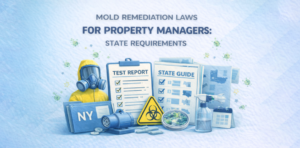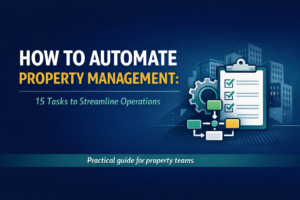
Providing exceptional customer service is essential in property management. As a property manager, you are not only responsible for maintaining the property but also for creating positive relationships with tenants, owners, and vendors. Offering excellent customer service can lead to higher tenant retention, better property reviews, and overall success in property management. In this guide, we’ll dive into the key principles of outstanding customer service in property management, providing you with practical tips for ensuring a top-notch experience for everyone involved.
Why Customer Service Matters in Property Management
In property management, customer service is much more than answering tenant inquiries or addressing maintenance requests. It’s about creating an environment where tenants feel valued, heard, and taken care of. Good customer service leads to satisfied tenants who are more likely to renew their leases, refer others, and take better care of the property.

For property owners, excellent customer service translates into better tenant retention, fewer vacancies, and the potential for increased property value. In fact, property management companies with strong customer service practices often experience smoother operations and higher profitability.
Key Principles of Exceptional Customer Service in Property Management

Let’s break down the essential principles that lead to exceptional customer service in property management.
1. Effective Communication
Clear and open communication is the foundation of great customer service. It’s important to communicate with tenants in a timely and professional manner. Whether it’s responding to an email, addressing a phone call, or updating tenants about a maintenance issue, being proactive in your communication will build trust and make tenants feel heard.
Tips for improving communication:
-> Always respond promptly to emails, phone calls, and text messages.
-> Use multiple channels to communicate (email, phone, app, in-person) to accommodate different tenant preferences.
-> Keep tenants updated about maintenance schedules or any changes in property policies.
-> Use simple and clear language, avoiding jargon, to ensure your messages are easily understood.
2. Be Available and Accessible
Tenants need to know that they can reach out to you when they have an issue or question. Being available and accessible not only helps with problem resolution but also demonstrates your commitment to their satisfaction.
How to be more accessible:
-> Provide clear contact information, including after-hours contact options for emergencies.
-> Set regular office hours and ensure tenants know when they can visit or call.
-> Use property management software like Propertese that allows tenants to submit requests or track maintenance progress.
-> For emergency situations, have a 24/7 hotline or contact for tenants to reach out to immediately.
3. Respond Quickly and Efficiently
One of the most frustrating experiences for tenants is waiting for a response. Whether it’s a maintenance request or a lease inquiry, quick responses make a big difference in how tenants feel about their property manager. Responding promptly doesn’t just solve the immediate issue but also shows that you value their time.
Tips for faster response times:
-> Set response time goals, like replying to all inquiries within 24 hours.
-> Use automated systems to confirm receipt of requests, even if you can’t address them immediately.
-> Delegate tasks where appropriate to avoid delays in handling tenant concerns.
-> Prioritize issues based on urgency, ensuring that critical matters are resolved quickly.
4. Be Empathetic and Understanding
Empathy is a key component of good customer service. Tenants want to feel understood, especially when they are dealing with issues such as repairs, late rent payments, or maintenance disruptions. By showing empathy, property managers can create a positive atmosphere and handle sensitive situations with care.
How to show empathy:
-> Listen actively when tenants share concerns or complaints, and acknowledge their feelings.
-> Offer solutions that take their needs into consideration, even if it’s just providing updates regularly.
-> Be patient and maintain a calm demeanor, even when dealing with difficult situations or complaints.
-> When resolving a problem, explain your actions and the timeline, so tenants don’t feel left in the dark.
5. Provide Timely Maintenance and Repairs
Maintenance issues are one of the most common tenant complaints. A well-maintained property shows that you care about the tenants’ comfort and safety, which is crucial for tenant satisfaction. Whether it’s a leaky faucet, heating problems, or a broken appliance, handling maintenance requests quickly and efficiently can go a long way in maintaining positive relationships.
Best practices for maintenance and repairs:
-> Implement a simple and clear maintenance request process so tenants can report issues easily.
-> Prioritize urgent repairs (e.g., plumbing leaks, heating issues) to prevent larger problems.
-> Follow up with tenants after the repair is complete to ensure they’re satisfied with the work.
-> Keep a reliable team of maintenance professionals who are skilled, courteous, and prompt.
6. Treat Tenants with Respect
Respect is at the core of any good relationship, including the one between a property manager and tenant. Treat tenants with kindness and fairness, and show them that you value them as customers. Being respectful helps build a positive reputation for your property management and fosters trust.
Ways to demonstrate respect:
-> Be professional and polite in all interactions, whether in person, over the phone, or via email.
-> Honor agreements, including rent prices, lease terms, and maintenance schedules.
-> Avoid micromanaging tenants or being intrusive. Respect their privacy and personal space.
-> If problems arise, approach them in a non-confrontational, respectful manner.
7. Be Knowledgeable and Well-Prepared
As a property manager, tenants will look to you for advice and information about the property and the lease. Being knowledgeable and prepared with the answers to common questions helps build credibility and trust. Whether it’s understanding the lease terms, rules about pets, or knowing local resources, having the right information on hand makes you a reliable resource for tenants.
How to stay knowledgeable:
-> Familiarize yourself with the lease agreements, local laws, and building policies to answer questions effectively.
-> Stay updated on property changes, improvements, and new regulations that may affect tenants.
-> Offer educational materials, such as a tenant handbook or FAQs, to help tenants understand the property and its rules.
8. Focus on Building Relationships
Great customer service is about building relationships that go beyond solving problems. When property managers make an effort to connect with tenants on a personal level, they create a stronger bond and a better living experience. Happy tenants are more likely to renew their leases and recommend your property to others.
Ways to build better relationships:
-> Get to know your tenants by remembering their names, their needs, and their preferences.
-> Celebrate milestones like birthdays or lease anniversaries with small gestures (like sending a card or offering a special promotion).
-> Encourage feedback through surveys or direct conversations to show that you care about their opinion.
Conclusion
Providing exceptional customer service in property management requires a commitment to clear communication, respect, empathy, and efficiency. By embracing these key principles, property managers can foster a positive environment for tenants and owners alike. Great customer service doesn’t just solve problems, it builds relationships, enhances tenant satisfaction, and contributes to the long-term success of the property.
With a focus on improving communication, responsiveness, and tenant care, property managers can differentiate themselves in a competitive market and create lasting, mutually beneficial relationships with tenants. Whether you’re managing a single building or a large portfolio, these customer service principles will help you deliver outstanding service every time.
Table of Contents
Stay Updated
Subscribe to get the latest news, industry trends, blog posts, and updates...




